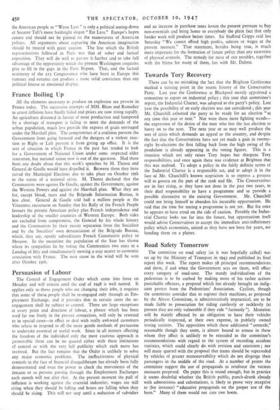Towards Tory Recovery
There can be no mistaking the fact that the Brighton Conference marked a turning point in the recent history of the Conservative Party. Last year the Conference at Blackpool merely appointed a committee to report on industrial policy ; this year that committee's report, the Industrial Charter, was adopted as the party's policy. Last year the possibility of an early election was not considered ; this year Mr. Churchill exhorted the party to be ready for an election "at any time this year or next." Nor were these mere fighting words— the expression of the desire of the man who lost the last election to hurry on to the next. The next year or so may well produce the sort of crisis which demands an appeal to the country, and despite the fact that the Conservatives have not yet made a gain in twenty- eight by-elections the first falling back from the high swing of the pendulum is already appearing in the voting figures. This is a situation which not only raises Tory hopes but sharpens Tory responsibilities, and once again there was evidence at Brighton that this was realised. To adopt a policy in the fairly definite terms of the Industrial Charter is a responsible act, and to adopt it in the face of Mr. Churchill's known scepticism is to express a positive will to govern on the part of the rank and file. The Conservatives are in fact rising, as they have not done in the past two years, to their dual responsibility to have a programme and to provide a possible alternative to the existing Government. Mr. Churchill could not bring himself to abandon his incurable opportunism. He said that the time for stating a programme is not yet. But for once he appears to have erred on the side of caution. Possibly the Indus- trial Charter looks too far into the future, but opportunism itself would advise Conservatives to accept the immediate anti-inflationary policy which economists, united as they have not been for years, are handing them on a platter.


































 Previous page
Previous page